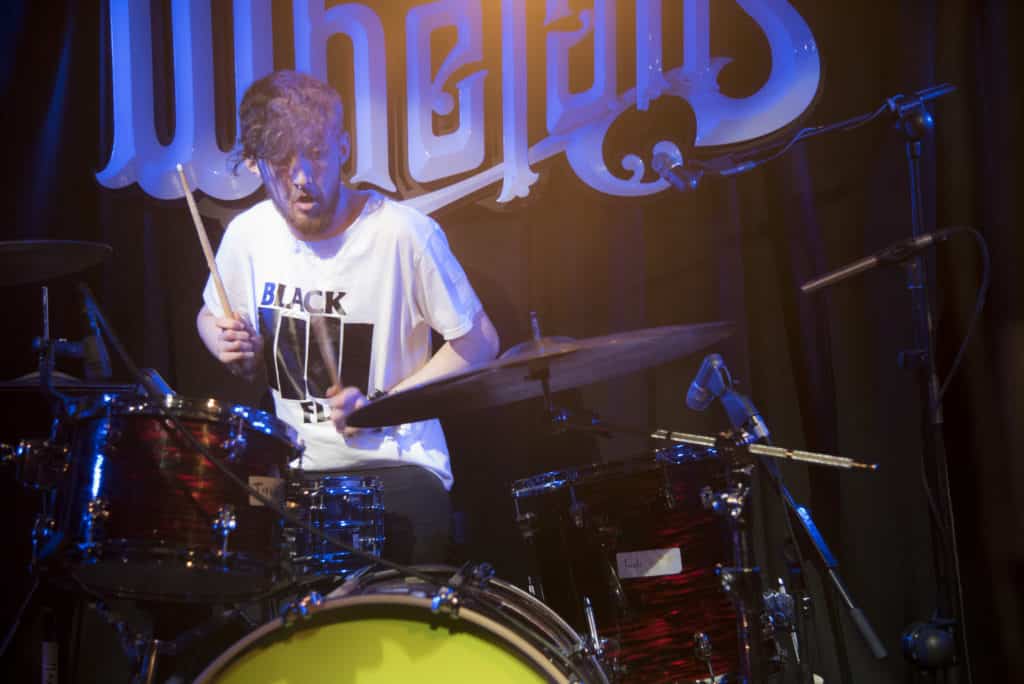BA (Hons) Commercial Modern Music
TU CODE: TU961
Apply NowIf you’re a musician who wants to gain a degree-level qualification, but also fulfil your creative and commercial potential, then BA (Hons) Commercial Modern Music is the right choice to help turn your passion for music into a career.
This four-year programme aims to develop your performance skills at the same time as progressing your career goals, using a deadline-driven project management approach.
At BIMM Dublin, we understand that live performance is the key to you becoming a great musician, so you’ll spend a lot of time on stage to help you develop and find your niche as a performer.
You’ll also further hone your skills by receiving tuition in techniques, music theory and styles across a wide range of genres from pop, punk, folk and funk. The degree is both academically and musically challenging, providing the perfect balance between practical and technical skills and theory and analysis.

You’ll be part of a creative community of gifted writers, performers, critical thinkers and music industry professionals who you can collaborate and network with to help bring your talent to life.
Through a range of optional modules, including Performance in Context, Studio Musicianship, Digital Marketing in The Music Business, Studio Recording, Commercial Songwriting, Music Business Studies and Music Teaching Practice, you can tailor the degree to fit your own personal goals.
Life at BIMM will stretch you as a musician and performer. It will also inspire you as a fan, as you attend unique Masterclasses with some of the best players and musicians in the world. You’ll also have the opportunity to audition for the BIMM Album and termly BIMM gigs.
Your course will culminate in either a Professional Project utilising academic research skills or Analytical Perspectives dissertation designed to investigate music through key concepts and theories associated with cultural studies. This will give you a head start into the workplace and enhance an appreciation and understanding of your cultural and social environment.
So, what are you waiting for? To make your way as a musician, connect with us and we’ll connect you to a life in music.

Course specification
Mode of attendance: Full-time
Length of course: Four years
Awarding institution: Technological University Dublin
Campus delivery: Dublin
TU Code: TU961
Level: 8
Language of study: English
Final award: Bachelor of Arts (Hons)
Admissions Criteria: 6 Leaving Certificate subjects +25s + audition*
*a minimum of 4 O6/H7s are required to meet the minimum entry requirement.
Minimum requirements
6 Leaving Certificate subjects +25s + audition*
All applicants must attend an audition at which they can earn up to 600 additional points to add to their Leaving Cert points.
*a minimum of 4 O6/H7s are required to meet the minimum entry requirement.
Progression
Graduates can progress directly to employment in the music industry in roles such as solo performer, band member, session musician, backing vocalist or songwriter.
Or, they can continue their studies with a BIMM Music Institute Postgraduate Course such as MA Popular Music Practice and MA Learning and Teaching in the Creative Industries.
Course fees
BA (Hons) in Commerical Modern Music falls under the free fees scheme. To check if you are eligible for free fees, take a look at the student finance website.
Detailed information on fees is available on the registration office at TU Dublin.
Year 1
Module names and structure may be subject to change.
This genre-based performance workshop focuses on the sounds and skills found in each style as it evolved. It includes historical context, critical listening and the techniques used by the world’s most influential musicians.
This module is designed to develop the student’s ability by honing technique and therefore facilitating enhancement of the student’s musical vocabulary. As technique develops, students will be able to execute more ideas within their chosen discipline and with greater dynamic control and accuracy.
The study path encompasses various different concepts, techniques and applications, in preparation for the many different playing situations that may be encountered.
A disciplined approach to regular practice is the key to success here, so the structuring of a focused and workable practice routine will be essential.
The module is also designed to help you develop your ability to interpret industry-standard notation in a wide range of musical settings.
This module includes practical music industry knowledge that will help students plan their career.
All aspects of the music industry will be covered in comprehensive detail including record deals, publishing deals, management, music synchronisation, legal issues, copyright, music teaching, live music and business planning.
This module explores the planning of key performances at local, national and international levels. Areas for study include rehearsal techniques, promotion, marketing, leadership, venues and promoters, tour management, stage management and budgeting.
The unit focuses on attention to detail and explores how to make things happen at the highest level.
In this module, students will learn a vocabulary for communicating ideas with other musicians. They’ll work on making sure that their band and performance are tight, well-arranged and professional, and that it sounds like a professional band through a big PA.
This module provides the student with an introduction to the fundamentals of music theory, with practical applications of theoretical concepts on the piano keyboard.
It will also facilitate the development of aural recognition and transcription skills, to better prepare the student for the range of musical situations they are likely to encounter as a professional musician.
Year 2
Module names and structure may be subject to change.
A continuation of the Year 1 module, this genre-based performance workshop focuses on the sounds and skills found in each style as it evolved. It includes historical context, critical listening and the techniques used by the world’s most influential musicians.
A continuation of the Year 1 module, this unit will enable musicians to develop other areas of technical study, as well as enhancing their musical vocabulary. A disciplined approach to regular practice is essential for success in this unit.
This module includes practical music industry knowledge that will help students plan their career. All aspects of the music industry will be covered in comprehensive detail including record deals, publishing deals, management, music synchronisation, legal issues, copyright, music teaching, live music, and business planning.
This module consists of three components or learning arcs undertaken by both the instrumentalist stream and the songwriting stream.
The components are designed to be a continuation of key skills addressed in Year 1 and preparation for key skills required to enable the fulfilment of learning outcomes underpinning modules in Years 3 and 4.
The indicative syllabus associated with each component will inform and aid the development of a broad skill set and encourage a spirit of curiosity and a desire to learn among students.
The individual module components are:
1. Cultural Theory, An Introduction
2. Personal & Professional Development
3. Research Methods, Academic Writing and Pedagogy, An Introduction.
The module will consist of a series of thematic cycles, each beginning with a lecture-based class, giving the student an overview of the social, political and philosophical nuances associated with key live performances and their subsequent cultural impact.
A grounding in critical theory provided through content covered in DN/MM614 Essential Development Skills will also inform the approaches and discussion students are expected to undertake in Performativity and Live Music.
The module also takes the student through the process of effective live performance, from thorough individual preparation to live ensemble performance. It provides musicians with an opportunity to build upon the work undertaken in the previous Live Performance Workshop classes.
Students are now expected not only to take full responsibility for preparing the track and to have a much greater understanding of detail within performance, refining the parts, consistency, timekeeping and groove; but to also deconstruct assigned tracks and to reinterpret the tracks through experimentation shaped by engagement with the cultural theories associated with each thematic cycle.
Musicians will be encouraged to develop confident professional performance techniques, creative flair, arrangement skills and the interpersonal skills necessary for effective communication, all of which are essential to professional preparation and performance.
This module provides the student with an opportunity to consolidate, develop and apply the music theory concepts studied in Theory, Notation and Keyboard Skills.
It will facilitate further the development of aural transcription skills, along with a more detailed study of the theory behind the music, including practical applications of theoretical concepts to better prepare the student for the range of musical situations they are likely to encounter as professional musicians.
Year 3
All students take mandatory and optional modules in their third year of study.
Module names and structure may be subject to change.
Musicians undertake a research project that supports their planning for the Professional Project module. For example, a vocalist could research the techniques involved in getting a vocal sound in the studio, or a band musician planning a national tour could prepare a case study on a relevant breaking act or important venue.
This module covers the comprehensive history of popular music from 1900 to 1970, which analyses the social and political conditions that influenced the development of the art form, as well as evaluating key releases from influential artists.
This unit focuses on high-level technical development on guitar. In addition to the lectures on technique, musicians will need to choose an area in which to specialise. This will be chosen in negotiation with the lecturers.
This module assists musicians with ear training, transcription skills and notation. It discusses broad theoretical issues and introduces non-Western and ‘classical’ techniques of composition, analysis and performance.
In this class, musicians map their own performances against professional work using original and cover material. Performances are routinely videoed and critically assessed in small group settings.
In this module, musicians will be placed in simulated, ‘deadline-driven’ recording session environments. They’ll be encouraged to attain an understanding of professional production values and an awareness of the responsibilities of the recording musician. These responsibilities will include professional performance skills, studio etiquette and technical knowledge.
This module addresses the need for modern music practitioners to be digitally literate and dynamic entrepreneurs, enabling them to directly engage with their target audience. Some of the areas covered include data collection, analytics, social media marketing, artist branding, direct email marketing, website design, marketing campaigns, digital music stores and benchmarking.
This module is designed to help studio musicians understand basic engineering principles and take responsibility for the sonic direction of their recordings. With this knowledge, any musician should be able to get a quality tone in even the most basic of studios. Studio-based arrangement skills are also covered.
This module will address the musical and technological aspects of writing and producing popular songs and will include focusing on song form and structures (AABC, etc.), cadences and chord progressions, modulation, writing and harmonising melodies, lyric writing, and applying learning to original material.
Linked to this theme will be the introduction of technical training in the use of Digital Audio Workstations (DAW), which have become the mainstay of this discipline.
This module will familiarise musicians with fundamental issues in music publishing, including history of the industry, key concepts of copyright, collection societies, analysis of music publishing contracts, sub-publishing, and synchronisation.
It will encourage songwriters/musicians to apply their knowledge in real-world situations with their own material.
Year 4
All students take mandatory and optional modules in their fourth year of study.
Module names and structure may be subject to change.
This module ensures that students confront their responsibilities as professionals and manage a project that is rooted firmly in the professional world. Jobs in the music business vary enormously and musicians need to be adaptable and flexible in order to carve their own niche in the industry.
Final projects must be realistic and achievable and are linked with the earlier Course Planning and Research Methods modules. During the module, students will consolidate the skills and experience gained through the course of their studies.
These include industry-related skills, and research methods enabling them to analyse, interpret, and reflect upon their chosen project activity in a systematic fashion.
In the final stage of their studies, students will be able to utilise their analysis of past experience to create theories upon which to base models for future working practice.
This module presents a critical history of popular music from 1970 to the present day. Significant artists will be examined in relation to their cultural, social and political impact and their continuing influence on contemporary music genres.
The module will also draw on theoretical contexts found in the wider discipline of cultural studies, such as critical theory and postmodernism. You will be expected to develop a sophisticated understanding of our cultural and musical antecedents and will be encouraged to analyse, synthesise and evaluate the circumstances around significant moments in the history of popular music since 1970.
This module will oblige you to engage with in-depth reading and demonstrate an appropriate level of academic rigour. You will be required to engage in critical debate with full justifications and explanations for your reasoning.
In this module, musicians perform either on their own or using backing tracks. A clinic-style presentation could work well in this module, and work is compared to professional material with students critically assessing their progress and attainment.
This unit gives musicians the opportunity to showcase four years of live performance experience in a final ensemble setting. Students are encouraged to consider how their work will be perceived as professional artists and to map their work against other, established professionals.
This module will further address the musical and technological aspects of writing and producing popular songs and will include a focus on composition for the media and moving image, alongside commercial concerns and production values vital to this discipline. Musicians will continue to develop technical skills along with creative techniques common to working with sound and image.
This module involves a thorough investigation into the music business, with detailed analysis of contracts and music business structures. There will also be high-profile guest speakers.
This module deals with the development of strong teaching skills, from one-to-one tuition to large group classroom work. Small teaching practice business models are discussed and musicians can investigate full-time teaching as a career option either in mainstream education or as a private practitioner.
Musicians are encouraged to consider and facilitate their own personal and business development, an essential activity for band members, songwriters and singers alike.
The module will take students through the stages of identifying professional development needs, with specific topics covered including effective team working, stress management, time management and goal setting.
This is an elective module aimed at students with a strong aptitude for music theory that wish to deepen their understanding of advanced theory concepts, and further develop their composition and arrangement skills through song analysis and practical application.
]This module will consolidate, and develop on, the concepts covered in Advanced Music Theory and Arrangement in a project-based environment, through their application on DAWs and notational software, using sample libraries and industry-standard notation.
Paul is Course Leader for Bass at BIMM Music Institute Dublin. He has been playing bass professionally…
Ray is a Principal Lecturer for Guitar at BIMM Music Institute Dublin. He began his career in…
Robbie Malone is most well known as the bass player for David Gray, although his bass-playing career…
Shelley Bukspan was born in The Bronx, N.Y, and immigrated to Ireland in 1986. Since the…
Steve teaches Drums at BIMM Music Institute Dublin. He is a very much in-demand drummer on…
Tine teaches Vocals at BIMM Music Institute Dublin. For over 25 years, Tine has been a…
Any questions?
For any questions regarding our courses or if you’d like more information on how to apply to BIMM Music Institute, please contact our Admissions Team on +353 1 5133 666 or email [email protected].

